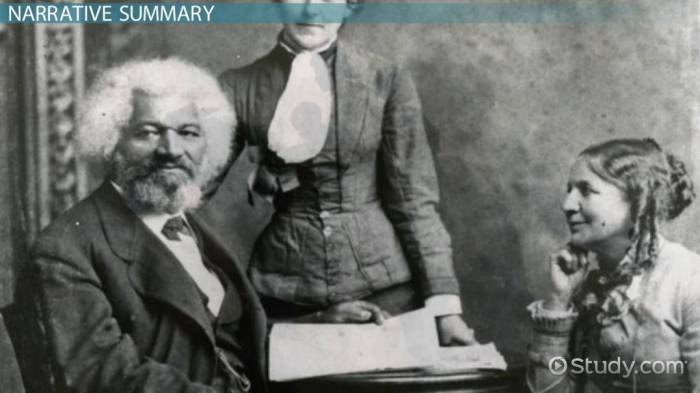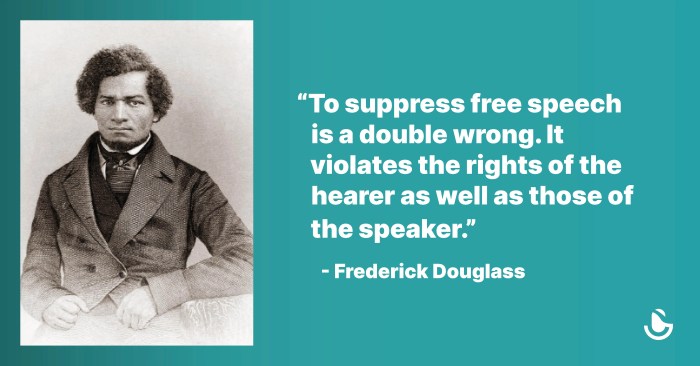Frederick Douglass Chapter 7 Summary: A Journey to Freedom and Identity delves into a pivotal chapter in the narrative of Frederick Douglass, a prominent abolitionist and author. This chapter narrates Douglass’s perilous journey to the North, his harrowing experiences at the Covey plantation, and the profound impact these events had on his understanding of identity and freedom.
Douglass’s escape from slavery and his subsequent journey to the North marked a transformative period in his life. This chapter sheds light on the challenges he faced during his escape, the brutal conditions he endured at the Covey plantation, and the influence of Frederick Bailey, a free Black man who played a significant role in shaping Douglass’s activism and writing.
Introduction to Chapter 7: Frederick Douglass Chapter 7 Summary
Chapter 7 of Frederick Douglass’s narrative holds significant importance as it marks a turning point in his journey towards freedom and self-discovery. This chapter chronicles his experiences as a skilled laborer and the challenges he faced in navigating the complexities of slavery while yearning for liberation.
Throughout Chapter 7, Douglass explores themes of resistance, self-reliance, and the pursuit of knowledge. He recounts his attempts to acquire literacy and his encounters with individuals who both hindered and supported his aspirations.
Douglass’s Skilled Labor and the Value of Education
Douglass’s experiences as a skilled laborer demonstrate the complexities of slavery and the ways in which enslaved individuals could negotiate their circumstances. Despite his physical labor, Douglass’s ability to read and write allowed him to gain a sense of agency and to challenge the limitations imposed upon him by the institution of slavery.
Resistance and the Pursuit of Freedom
Chapter 7 also highlights Douglass’s unwavering determination to escape slavery. He describes his covert attempts to acquire knowledge, his collaboration with fellow slaves, and his ultimate decision to risk his life for freedom. Douglass’s narrative provides a powerful account of the resilience and determination of enslaved individuals who dared to challenge the status quo.
Douglass’s Journey to the North

Douglass’s decision to escape from slavery was motivated by his desire for freedom and a better life. He had witnessed the horrors of slavery firsthand and knew that he could not continue to live under such oppression. In September 1845, Douglass disguised himself as a sailor and boarded a train to Wilmington, Delaware.
From there, he traveled by boat to Philadelphia and then to New York City.
Challenges and Obstacles
Douglass’s journey to the North was fraught with challenges and obstacles. He had to travel incognito to avoid being caught by slave catchers. He also had to find food and shelter along the way, which was difficult for a runaway slave.
Despite these challenges, Douglass persevered and eventually reached New York City, where he was safe from being recaptured.
4. The Influence of Frederick Bailey
The significance of Douglass’s name change from Frederick Bailey to Frederick Douglass cannot be overstated. His new identity became a symbol of his transformation from a slave to a free man and a prominent abolitionist.
Douglass’s former name, Frederick Bailey, was given to him by his enslaver, Colonel Edward Lloyd. It was a common practice for slaveholders to give their slaves names that reflected their status as property, rather than as individuals. By changing his name to Frederick Douglass, Douglass asserted his own identity and rejected the dehumanizing legacy of slavery.
Douglass’s Activism and Writing
The influence of Frederick Bailey on Douglass’s activism and writing is evident throughout his life and work. Douglass’s experiences as a slave gave him a deep understanding of the horrors of the institution and the importance of fighting for freedom and equality.
- Abolitionist Movement:Douglass became a leading voice in the abolitionist movement, delivering powerful speeches and writing influential articles that exposed the evils of slavery and advocated for its immediate end.
- Narrative of the Life of Frederick Douglass:Douglass’s autobiography, “Narrative of the Life of Frederick Douglass, an American Slave,” is a powerful and moving account of his experiences as a slave. The book became a bestseller and helped to galvanize the abolitionist movement.
5. The Abolitionist Movement

The abolitionist movement played a pivotal role in Frederick Douglass’s life and career. He became deeply involved in the movement after escaping slavery in 1845, and he quickly emerged as one of its most influential voices.
Douglass’s speeches and writings were instrumental in raising awareness of the horrors of slavery and mobilizing support for its abolition. He spoke eloquently about his own experiences as a slave, and he challenged the racist arguments that were used to justify slavery.
Douglass’s Speeches
Douglass was a gifted orator, and his speeches were often electrifying. He spoke to large audiences throughout the United States and Europe, and his words helped to galvanize the abolitionist movement.
- In his speeches, Douglass argued that slavery was a crime against humanity and that it had no place in a civilized society.
- He also challenged the idea that blacks were inferior to whites, and he demanded equal rights for all.
Douglass’s Writings
In addition to his speeches, Douglass also wrote extensively about slavery. His autobiography, Narrative of the Life of Frederick Douglass, an American Slave, was published in 1845 and became a bestseller.
- In his autobiography, Douglass described his experiences as a slave in vivid detail.
- He also wrote about the abolitionist movement and the need for social reform.
Douglass’s writings helped to educate the public about the realities of slavery and to build support for the abolitionist cause.
6. Themes of Identity and Freedom
Chapter 7 delves into the profound themes of identity and freedom, which profoundly shaped Frederick Douglass’s life and philosophy. Douglass’s experiences as a slave and his subsequent journey to freedom profoundly influenced his understanding of these concepts.
Identity
Douglass’s experiences as a slave forced him to grapple with his own identity. He was legally considered property, denied basic human rights, and subjected to dehumanizing treatment. Yet, amidst these oppressive circumstances, Douglass clung to his sense of self-worth and dignity.
He rejected the labels imposed on him by slavery and asserted his own individuality.
Freedom
Douglass’s quest for freedom was a driving force throughout his life. He yearned for physical emancipation from slavery, but he also recognized the importance of intellectual and spiritual freedom. Douglass’s escape to the North symbolized not only his physical liberation but also his pursuit of a life of dignity and purpose.
He dedicated his life to advocating for the abolition of slavery and promoting the cause of human rights.
7. The Legacy of Chapter 7

Chapter 7 of Frederick Douglass’s narrative stands as a pivotal chapter in both his personal journey and the broader abolitionist movement. Its lasting impact has shaped the understanding of slavery, freedom, and the complexities of American history.
Douglass’s Personal Narrative, Frederick douglass chapter 7 summary
For Douglass, Chapter 7 marked a profound turning point. His escape from slavery and journey to the North empowered him to share his firsthand experiences and galvanize the abolitionist cause. The chapter’s vivid descriptions of the horrors of slavery and the struggles faced by enslaved people resonated deeply with readers, humanizing the victims and challenging prevailing misconceptions.
The Abolitionist Movement
Chapter 7 became a powerful tool for abolitionists, providing irrefutable evidence of the brutality and inhumanity of slavery. Its publication in 1845 coincided with the rise of the abolitionist movement, and Douglass’s narrative played a crucial role in mobilizing support for the cause.
The chapter’s compelling accounts of the physical and psychological toll of slavery swayed public opinion and contributed to the growing momentum for abolition.
American History and Literature
Beyond its impact on the abolitionist movement, Chapter 7 has enduring significance in American history and literature. It offers a firsthand account of the horrors of slavery, shedding light on one of the darkest chapters in American history. The chapter’s literary power and Douglass’s eloquence have made it a foundational text in American literature, studied by generations of students and scholars.
Top FAQs
What was the significance of Chapter 7 in Frederick Douglass’s narrative?
Chapter 7 narrates Douglass’s journey to the North, his experiences at the Covey plantation, and the influence of Frederick Bailey, shaping his understanding of identity and freedom.
What were the challenges Douglass faced during his escape to the North?
Douglass faced the risk of being captured and returned to slavery, as well as the physical and emotional toll of his journey.
How did Douglass’s experiences at the Covey plantation impact him?
The brutal conditions and treatment Douglass endured at the Covey plantation fueled his determination to fight for freedom and shaped his understanding of the horrors of slavery.

